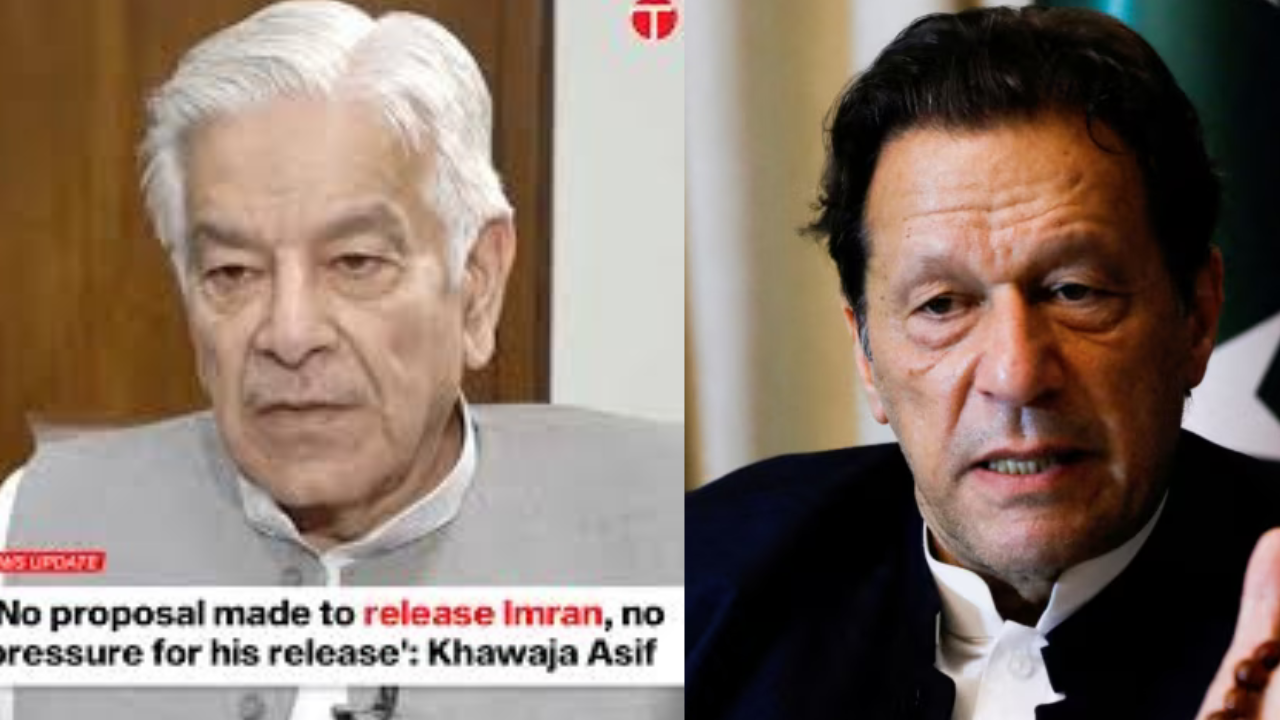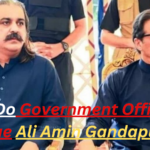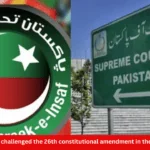<iframe src="https://bwidget.crictimes.org/" style="width:100%;min-height: 250px;" frameborder="0" scrolling="yes"></iframe>
Imran Khan’s move from jail to his home has been denied by Pakistan’s defense minister.

In a highly significant political move, Khawaja Asif, Pakistan’s defense minister, has simply denied rumors that the administration wanted to move former prime minister Imran Khan from prison to his home. Given that Khan, the chairman of the Pakistan Tehreek-e-Insaf (PTI) party, is still dealing with a number of legal issues, reports have been making the rounds and contributing to the tense political climate in the nation.
Political Controversy Is Motivated by Allegations: Imran Khan
According to some accounts, the government gave Khan a short-term break by letting him serve his sentence at home under limitations in an effort to defuse tensions. This sparked initial reports about the purported offer in the local media. Supporters of the PTI and opposition parties swiftly seized upon the allegations, portraying them as proof of a backdoor agreement between the government and the troubled former PM.
The reports were strongly refuted by Khawaja Asif, a senior member of the ruling Pakistan Muslim League-Nawaz (PML-N). Asif described the accusations as “utterly baseless” and an effort to deceive the people during a press briefing held in Islamabad on Saturday.
To be clear, Imran Khan has not received such an offer. This administration is dedicated to maintaining accountability and respecting the rule of law. “These rumors are part of a larger disinformation campaign.”
Imran Khan’s Court Cases Imran Khan
Since a parliamentary no-confidence vote in April 2022 ousted Imran Khan from government, his political fortunes have been steadily deteriorating. Khan’s legal struggles have eclipsed his political agenda, as he faces charges ranging from contempt of court to corruption. He was just found guilty in the Toshakhana case, which concerns the purported abuse of official gifts he was given while serving as prime minister.
Khan is presently incarcerated for three years in Attock Jail, an institution renowned for its harsh conditions. Concerns regarding his health and safety have been raised time and time again by PTI leaders and followers, who have called for his transfer to a more welcoming setting. If accurate, the purported government proposal would have represented a major compromise and may have defused the current political conflict.
The Position of the Government on Transparency Imran Khan
Under Prime Minister Shehbaz Sharif’s leadership, the federal government has repeatedly underlined its dedication to holding all public servants accountable, regardless of their party connections. Khawaja Asif restated this position in a statement to the media, emphasizing that there will be no compromise on the legal process.
“Everyone must respect our legal system. No one is above the law, regardless of how powerful they are,” Asif said. “Any allegations of preferential treatment are baseless, as Imran Khan’s conviction and imprisonment were the outcome of due process,” the statement said.
Asif also denounced what he called the PTI’s “politics of victimhood,” claiming that the party was exploiting the incarceration of its leader as a focal point to win over the public.
PTI’s Response
As planned, the Pakistan Tehreek-e-Insaf party has reacted angrily to the decision, accusing the government of trying to damage the reputation of its leader. Khawaja Asif’s denial was rejected by PTI spokesperson Fawad Chaudhry as “part of a broader campaign to suppress dissent.””
“It is obvious that the government is trying to discredit Imran Khan and destroy the PTI with these tactics. In a televised remark, Chaudhry added, “These weak denials do nothing to change the reality of the persecution our leader is facing.”
He also claimed that Khan’s incarceration was politically motivated and intended to remove him from the political scene in advance of the general elections that are set for later this year.
Legal Q&A: Public Experts Offer Their Opinions
The topic caused a range of responses from the public, which reflects the intense political division in Pakistan. Critics contend that Khan’s legal issues are self-inflicted, resulting from his alleged disrespect for institutional standards during his time as prime minister, while PTI supporters see Khan as the victim of a political vendetta.
However, legal professionals have raised important issues about the wider ramifications of how the government handles well-known cases. Although the government’s position on accountability is admirable, Barrister Ayesha Siddiqui, an expert in constitutional law, pointed out that it must guarantee transparency in its operations.
“The perception of fairness is just as important as the legal outcome in such politically charged cases.” Public confidence in the judiciary can be damaged by any suggestion of preferential treatment or a lack of due process, according to Siddiqui.
A Broader Political Background
The dispute arose during a period of increased political unrest in Pakistan. The administration is under tremendous pressure to produce results since the economy is in terrible shape, as evidenced by skyrocketing inflation and declining foreign reserves. Both the government coalition and the PTI have accused one another of corruption and poor administration, with accountability and governance playing a major role in the political narrative.
Another level of difficulty is introduced by the approaching general elections. The political landscape has drastically changed as a result of Imran Khan’s imprisonment, and PTI is now in a vulnerable position as it tries to hold onto its support base without its popular leader. In the meantime, the PML-N is working to strengthen its position by forming an alliance with other PDM groups.
Global Observers Keep an Eye on the Situation
The political changes in Pakistan have garnered worldwide attention as well, and foreign organizations and countries are keeping a careful eye on the situation. The European Union, the United States, and the United Kingdom have all voiced concerns about the country’s political liberties and rule of law.
Human Rights Watch recently called on the Pakistani government to guarantee the complete protection of Imran Khan’s legal rights. The statement said, “Pakistan’s democracy is being put to the test by how its political opponents are treated.”
What’s Next?
The wider ramifications of the dispute are yet unknown as Khawaja Asif’s denial comes to an end. The stakes are higher than ever for all political players as the general elections draw near. The government’s ability to remain credible depends on its ability to act impartially and with respect for the law. PTI’s priorities continue to be rallying popular support and overcoming the obstacles presented by its leader’s incarceration.
According to political observers, there is little chance that the current tensions will end anytime soon. “This is about the future development of Pakistan’s democracy, not just about Imran Khan or the PML-N,” said Dr. Hassan Raza, a professor of political science at Quaid-e-Azam University.




